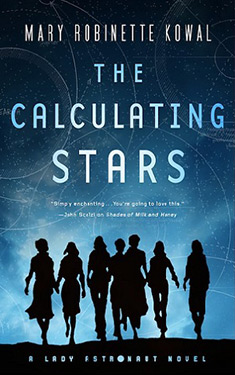Mary
Robinette Kowal
Completed 9/7/2019,
Reviewed 9/10/2019
4 stars
I was really
impressed by this book. It deals with sexism
and racism in a 1950’s alt-history post-apocalyptic setting. It was tight, fast paced, and well-written
with a marvelous female lead. I read
this book on vacation and was listening to “Lucifer’s Hammer” on the road,
which has a similar apocalyptic scene. The
books have some similarities, and a couple of times, I got the characters
confused. But while that book is a
disaster novel, this book is more focused on the social issues of the day, with
the disaster acting as a backdrop.
However, the disaster part of the book was one of the best I’ve ever
read, being a small-scale narrative rather than trying to explain all the global
details. Kowal won both the Nebula and
the Hugo Awards for this.
 Dr. Elma
York is a brilliant mathematician and WWII pilot. She is with her husband Nathaniel in the
Poconos when a meteor slams into Washington, D.C. Most of the rest of her family is in D.C. and
on the coast in Charleston and are wiped out.
She and her husband escape by small plane to a military base in Kansas
which becomes the new capital. There she
discovers that the earth will experience climate events, first a global winter
followed by a runaway greenhouse effect.
This discovery prompts the U.S. government to form an international
effort to get people into space to begin colonizing other planets, as the earth
slowly becomes uninhabitable. Elma
believes she has what it takes to be an astronaut, but meets intense opposition
in the new space program. While working
as a computer (one who performs calculations) for the space program, she begins
a crusade to get women including women of color who are qualified to be accepted
as astronauts.
Dr. Elma
York is a brilliant mathematician and WWII pilot. She is with her husband Nathaniel in the
Poconos when a meteor slams into Washington, D.C. Most of the rest of her family is in D.C. and
on the coast in Charleston and are wiped out.
She and her husband escape by small plane to a military base in Kansas
which becomes the new capital. There she
discovers that the earth will experience climate events, first a global winter
followed by a runaway greenhouse effect.
This discovery prompts the U.S. government to form an international
effort to get people into space to begin colonizing other planets, as the earth
slowly becomes uninhabitable. Elma
believes she has what it takes to be an astronaut, but meets intense opposition
in the new space program. While working
as a computer (one who performs calculations) for the space program, she begins
a crusade to get women including women of color who are qualified to be accepted
as astronauts.
The book is
told in first person by Elma. She is a
great character with lots of guts and ambition.
She has one fatal flaw and that is she has terrible stage fright anxiety. She freaks out and vomits whenever she must speak
publicly or to a large group. She has to
deal with the social taboo of seeking help in this 1950’s world of
unenlightenment on mental illness. So in
addition to sexism and racism, she has to fight that as well. It makes for a wonderfully well-drawn
character. I really felt Elma’s drive to
become an astronaut, despite everything that was blocking her.
Nathaniel,
her husband, is also well done. He was
the lead engineer for U.S. aeronautics program and becomes the lead engineer
for the international space program. He’s
great, almost too perfect, as the supportive husband, who is completely understanding
of her and her issues. But he does act
as the foil to the misogynistic Stetson Parker, the bigoted and sexist lead
astronaut of the program. Parker is
mostly a charicature until the second half of the book when he shows his
humanity. There are other women in the
story who also fight for the right to become astronauts as well, but they take
a back seat to Elma’s narrative.
The disaster
part of the book, the beginning, is really well written. It doesn’t cover the details of the meteor slamming
into D.C., but instead describes the shock wave and earthquakes that affect our
main character. So unlike “Lucifer’s
Hammer”, it’s smaller scale in its disaster description, but it’s very
effective.
I give this
book four stars out of five. The character
development and plot are wonderful, and the writing is marvelous. I was enrapt in the book, despite sometimes
getting confused with “Lucifer’s Hammer”.
I haven’t read the other Nebula and Hugo winners, so I don’t know if it
deserved to win, but it definitely deserved the nominations. As a side note, this book is the first in a
duology and there are other short pieces which are part of the story. I’ve pretty much decided I’ll read all it
eventually.
No comments:
Post a Comment